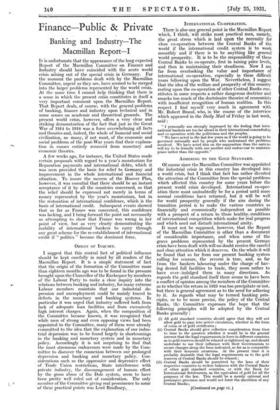ADHERING TO THE GOLD STANDARD.
Of,course since the Macmillan Committee was appointed the 'industrial crisis in this country has developed into a world crisis, but I think that fact has rather diverted the attention of the Committee from the special problems which affected this country for some years before the present world crisis developed. International co-oper- ation there must undoubtedly be for a period until more normal conditions have returned, but it will be well for world prosperity generally if the aim during the transition period is to make the various countries as financially and economically independent as possible with a prospect of a return to those healthy, conditions of international competition which make for real progress and which need not disturb international amity.
It must not be supposed, however, that the Report of the Macmillan Committee is other than a document of considerable imPortanCe, and when- some of the grave problems represented by the present German crisis have been dealt with will no doubt receive the careful and close attention which it deserves. On the whole it will be found that so far from our present banking system calling for censure, the reverse is true, and, so far from the bankers labouring under the charge of hav- ing denied full facilities to trade, they seem rather to have over - indulged them in many directions. As regards the gold standard itself there seems to have been a conflict of opinion among the members of the Committee as to whether the return in 1925 was too precipitate or not, but there is general agreement as to the need for adhering to it. As regards what • may be termed banking prin- ciples, or to be -more precise, the policy of the Central Banks, tin Committee expresses the hope that the following principles will be adopted by the Central Banks generally :
(i) All gold standard countries should agree that they will not allow gold to pass into active circulation; whether in the form of coins or of gold certificates ; (ii) Central Banks should give collective consideration from time to time to the question whether it would be in the general interest that the legal requirements in force in different countries as to gold reserves should be relaxed or tightened up, and should undertake to use their influence with their Governments to secure changes along the lines indicated, so far as is compatible with their domestic situations. At the present time it is probably desirable that the legal requirements as to the gold reserves of Central Banks should be relaxed ;
(iii) Central Banks should be permitted by the laws of their respective countries to reckon balances with the Central Banks of other gold standard countries, or with the Bank for International Settlements, as the equivalent of gold for all the purposes of the law. This would be a merely optional and permissive provision and would not force the discretion of any Central Banks jeontinued on page vi. )










































 Previous page
Previous page